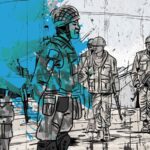
The Central African Republic (CAR) soldiers arrested 16 Cameroonians allegedly caught amid illegal logging in the country’s forest on Feb. 1. The arrest, which some have tagged ‘abduction’, has created palpable tension among authorities of CAR and Cameroon.
The 16 loggers were in a forest on the Cameroonian side of the border felling trees and sawing them to planks when the accused soldiers “erupted from nowhere and started harassing us”. They eventually rounded up the 16 Cameroonians and took them to their side of the border.
“The CAR soldiers claimed the area we were operating in was their territory. They accused us of illicit occupation in their territory,” one local who claimed to have escaped the soldier’s arrest, told HumAngle.
The sixteen Cameroonians are currently detained at the Dede Mokouba police station in the CAR. Ten among the arrested loggers are Yanguere natives of Ngoundi 1 village, while six are Anglophone Cameroonians.
When asked about the details of the matter, a local administrator who asked not to be named in this report for security reasons said he had been told the problem was caused by the CAR soldiers.
“They are said to have again arrested a number of our youths in the morning of Saturday, February 1, 2025 on the excuse that they were in their (CAR) territory, which is not true. This is not the first time these people are behaving like that. Last time, their mining squad came here and arrested our people. We ended up paying 500,000 FCFA (about 1,000 US dollars) after serious negotiations before they were freed,” the local administrator said.
Local sources revealed that the parents of some of the arrested loggers have gone to Dede Mokouba and CAR where their children are being held, adding that the villagers are still waiting for their return before deciding on what further steps to take. The local administrative authorities say they will hold a crisis meeting today, Monday, February 3, to decide on the official steps to be taken.
“The situation is dangerous because the CAR soldiers have invaded this zone with more than thirty of their elements heavily armed and hooded. The soldiers ordered our village populations to no longer carry out their farming activities in Cameroonian territory, because, according to them, all the land in these zones is Central African Republic territory,” another senior administration official said.
Senior officials in the Ministry of External Relations in Yaounde are reluctant to speak on the record because it is a delicate situation.
Since 2014, Cameroon has participated actively in ending the ongoing crisis in the CAR under the banner of the United Nations Multidimensional Integrated Stabilization Mission in the Central African Republic (MINUSCA).
The 11th contingent of Cameroonian soldiers to join MINUSCA was dispatched last year. Cameroonian soldiers within the ranks of MINUSCA facilitated humanitarian assistance, promotion and protection of human rights, support for justice and the rule of law, disarmament, demobilisation and reintegration.
Sixteen Cameroonians were arrested by Central African Republic (CAR) soldiers on February 1 for allegedly engaging in illegal logging on what the CAR soldiers claim is their territory, sparking tensions between the two countries. The Cameroonians contend they were in their country’s forest when they were arrested and are currently held at Dede Mokouba police station in the CAR.
A local administrator described similar past incidents involving CAR forces, citing an instance where villagers paid a substantial sum to free detained individuals. A crisis meeting is planned to determine official responses, while CAR forces have expanded their presence in the disputed area, ordering locals to halt agricultural activities on the land they claim as CAR’s territory.
The situation is compounded by Cameroon’s active involvement in the UN’s stabilization mission in CAR since 2014, deploying military contingents to aid in humanitarian and stabilization efforts. The involvement and contributions of Cameroonian forces in MINUSCA complicate the diplomatic dynamics, with officials in Yaoundé hesitant to publicly address the sensitive matter.
